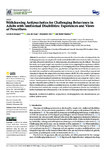Withdrawing Antipsychotics for Challenging Behaviours in Adults with Intellectual Disabilities: Experiences and Views of Prescribers
| dc.contributor.author | de Kuijper, Gerda | |
| dc.contributor.author | de Haan, J | |
| dc.contributor.author | Deb, Shoumitro | |
| dc.contributor.author | Shankar, Rohit | |
| dc.date.accessioned | 2022-12-20T11:56:50Z | |
| dc.date.available | 2022-12-20T11:56:50Z | |
| dc.date.issued | 2022-12 | |
| dc.identifier.issn | 1661-7827 | |
| dc.identifier.issn | 1660-4601 | |
| dc.identifier.other | ARTN 17095 | |
| dc.identifier.uri | http://hdl.handle.net/10026.1/20096 | |
| dc.description.abstract |
<jats:p>International current best practice recommends the discontinuation of antipsychotics for challenging behaviours in people with intellectual disabilities (ID), due to lack of evidence of efficacy and risks of harmful side-effects. In clinical practice, discontinuation may be difficult. The aim of this study was to gain insight into prescribers’ practice by investigating their experiences with the discontinuation of long-term antipsychotics for challenging behaviour. From professionals’ associations thirty-four registered ID physicians, psychiatrists and specialist mental healthcare nurses were recruited who completed an online questionnaire in this survey–study. Almost all participants had attempted to deprescribe antipsychotics for their patients with ID. Sixty-five percent of participants achieved complete discontinuation in 0–25% of their patients, but none in over 50%. Barriers were a lack of non-pharmaceutical treatments for challenging behaviours and caregivers’ and/or family concern. Seventy percent of participants indicated that their institutions had encouraged implementing their discontinuation policies in line with the new Dutch Act on Involuntary care and a new Dutch multidisciplinary guideline on problem behaviour in adults with ID. Support and facilitation of clinicians from institutions’ managers and political and professional bodies may be helpful in further implementation of best practice in the treatment of challenging behaviour in people with ID.</jats:p> | |
| dc.format.extent | 17095-17095 | |
| dc.format.medium | Electronic | |
| dc.language | en | |
| dc.language.iso | en | |
| dc.publisher | MDPI AG | |
| dc.subject | intellectual disabilities | |
| dc.subject | antipsychotics | |
| dc.subject | challenging behaviour | |
| dc.subject | discontinuation | |
| dc.subject | prescribers' policies | |
| dc.subject | survey | |
| dc.title | Withdrawing Antipsychotics for Challenging Behaviours in Adults with Intellectual Disabilities: Experiences and Views of Prescribers | |
| dc.type | journal-article | |
| dc.type | Journal Article | |
| plymouth.author-url | https://www.webofscience.com/api/gateway?GWVersion=2&SrcApp=PARTNER_APP&SrcAuth=LinksAMR&KeyUT=WOS:000900727300001&DestLinkType=FullRecord&DestApp=ALL_WOS&UsrCustomerID=11bb513d99f797142bcfeffcc58ea008 | |
| plymouth.issue | 24 | |
| plymouth.volume | 19 | |
| plymouth.publication-status | Published online | |
| plymouth.journal | International Journal of Environmental Research and Public Health | |
| dc.identifier.doi | 10.3390/ijerph192417095 | |
| plymouth.organisational-group | /Plymouth | |
| plymouth.organisational-group | /Plymouth/Faculty of Health | |
| plymouth.organisational-group | /Plymouth/Users by role | |
| dc.publisher.place | Switzerland | |
| dcterms.dateAccepted | 2022-12-15 | |
| dc.identifier.eissn | 1660-4601 | |
| dc.rights.embargoperiod | Not known | |
| rioxxterms.versionofrecord | 10.3390/ijerph192417095 | |
| rioxxterms.licenseref.uri | http://www.rioxx.net/licenses/all-rights-reserved | |
| rioxxterms.type | Journal Article/Review |


